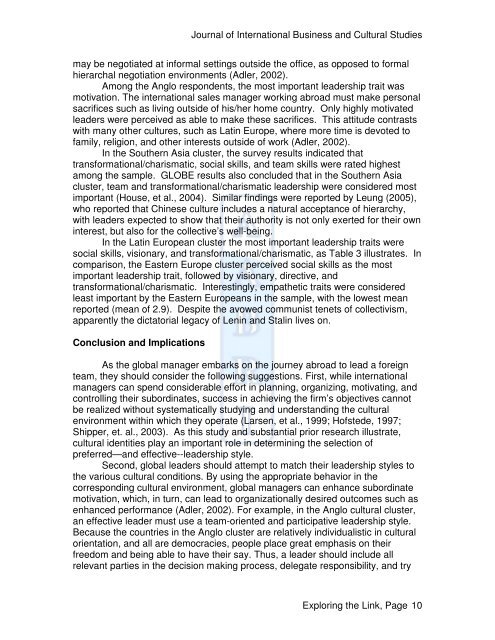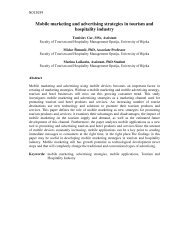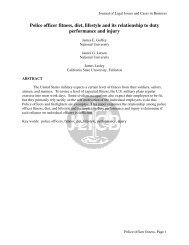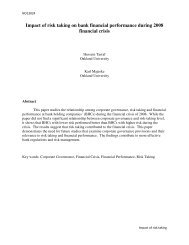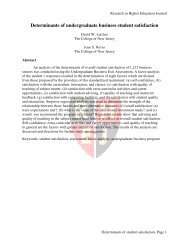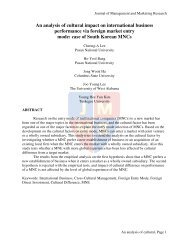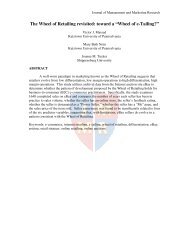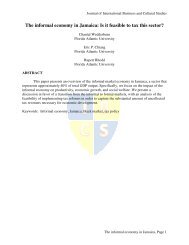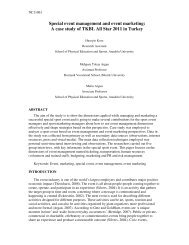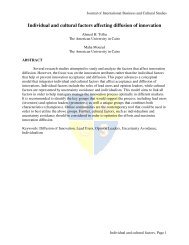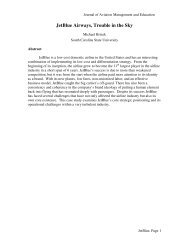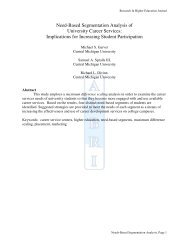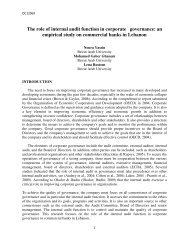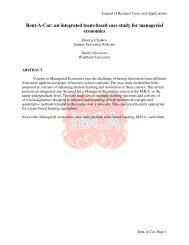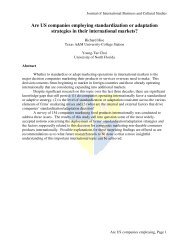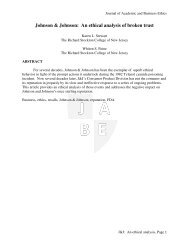Exploring the Link between Emotional Intelligence and Cross ...
Exploring the Link between Emotional Intelligence and Cross ...
Exploring the Link between Emotional Intelligence and Cross ...
Create successful ePaper yourself
Turn your PDF publications into a flip-book with our unique Google optimized e-Paper software.
Journal of International Business <strong>and</strong> Cultural Studies<br />
may be negotiated at informal settings outside <strong>the</strong> office, as opposed to formal<br />
hierarchal negotiation environments (Adler, 2002).<br />
Among <strong>the</strong> Anglo respondents, <strong>the</strong> most important leadership trait was<br />
motivation. The international sales manager working abroad must make personal<br />
sacrifices such as living outside of his/her home country. Only highly motivated<br />
leaders were perceived as able to make <strong>the</strong>se sacrifices. This attitude contrasts<br />
with many o<strong>the</strong>r cultures, such as Latin Europe, where more time is devoted to<br />
family, religion, <strong>and</strong> o<strong>the</strong>r interests outside of work (Adler, 2002).<br />
In <strong>the</strong> Sou<strong>the</strong>rn Asia cluster, <strong>the</strong> survey results indicated that<br />
transformational/charismatic, social skills, <strong>and</strong> team skills were rated highest<br />
among <strong>the</strong> sample. GLOBE results also concluded that in <strong>the</strong> Sou<strong>the</strong>rn Asia<br />
cluster, team <strong>and</strong> transformational/charismatic leadership were considered most<br />
important (House, et al., 2004). Similar findings were reported by Leung (2005),<br />
who reported that Chinese culture includes a natural acceptance of hierarchy,<br />
with leaders expected to show that <strong>the</strong>ir authority is not only exerted for <strong>the</strong>ir own<br />
interest, but also for <strong>the</strong> collective’s well-being.<br />
In <strong>the</strong> Latin European cluster <strong>the</strong> most important leadership traits were<br />
social skills, visionary, <strong>and</strong> transformational/charismatic, as Table 3 illustrates. In<br />
comparison, <strong>the</strong> Eastern Europe cluster perceived social skills as <strong>the</strong> most<br />
important leadership trait, followed by visionary, directive, <strong>and</strong><br />
transformational/charismatic. Interestingly, empa<strong>the</strong>tic traits were considered<br />
least important by <strong>the</strong> Eastern Europeans in <strong>the</strong> sample, with <strong>the</strong> lowest mean<br />
reported (mean of 2.9). Despite <strong>the</strong> avowed communist tenets of collectivism,<br />
apparently <strong>the</strong> dictatorial legacy of Lenin <strong>and</strong> Stalin lives on.<br />
Conclusion <strong>and</strong> Implications<br />
As <strong>the</strong> global manager embarks on <strong>the</strong> journey abroad to lead a foreign<br />
team, <strong>the</strong>y should consider <strong>the</strong> following suggestions. First, while international<br />
managers can spend considerable effort in planning, organizing, motivating, <strong>and</strong><br />
controlling <strong>the</strong>ir subordinates, success in achieving <strong>the</strong> firm’s objectives cannot<br />
be realized without systematically studying <strong>and</strong> underst<strong>and</strong>ing <strong>the</strong> cultural<br />
environment within which <strong>the</strong>y operate (Larsen, et al., 1999; Hofstede, 1997;<br />
Shipper, et. al., 2003). As this study <strong>and</strong> substantial prior research illustrate,<br />
cultural identities play an important role in determining <strong>the</strong> selection of<br />
preferred—<strong>and</strong> effective--leadership style.<br />
Second, global leaders should attempt to match <strong>the</strong>ir leadership styles to<br />
<strong>the</strong> various cultural conditions. By using <strong>the</strong> appropriate behavior in <strong>the</strong><br />
corresponding cultural environment, global managers can enhance subordinate<br />
motivation, which, in turn, can lead to organizationally desired outcomes such as<br />
enhanced performance (Adler, 2002). For example, in <strong>the</strong> Anglo cultural cluster,<br />
an effective leader must use a team-oriented <strong>and</strong> participative leadership style.<br />
Because <strong>the</strong> countries in <strong>the</strong> Anglo cluster are relatively individualistic in cultural<br />
orientation, <strong>and</strong> all are democracies, people place great emphasis on <strong>the</strong>ir<br />
freedom <strong>and</strong> being able to have <strong>the</strong>ir say. Thus, a leader should include all<br />
relevant parties in <strong>the</strong> decision making process, delegate responsibility, <strong>and</strong> try<br />
<strong>Exploring</strong> <strong>the</strong> <strong>Link</strong>, Page 10


